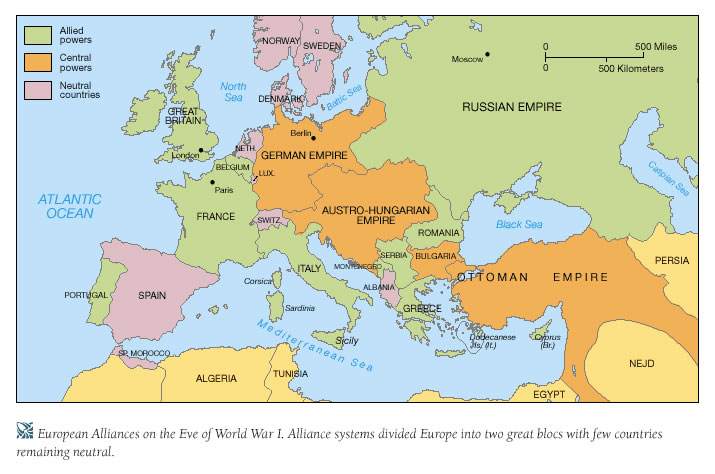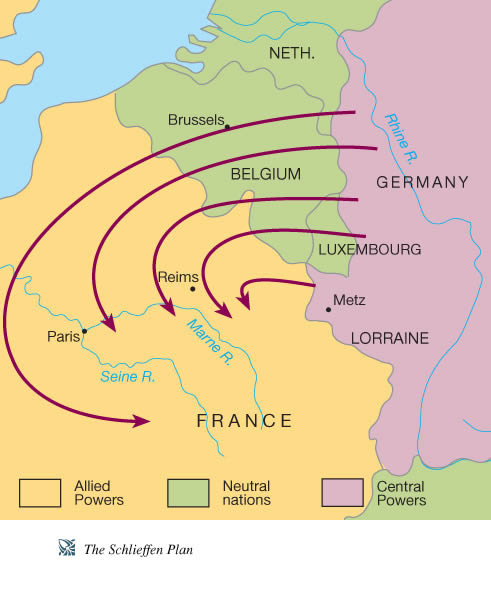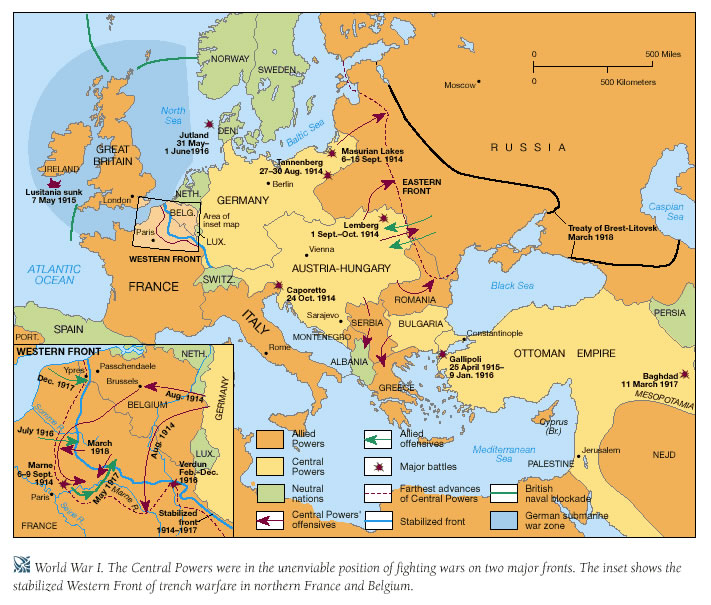reading for this week:
Paxton and Hessler, Chapters 4, 5, 6
•Lenin, "April Theses," a.k.a. "The Tasks of the Proletariat in the Present Revolution" (1917) at marxists.org
•Benito Mussolini, The Doctrine of Fascism (1932) at worldfuturefund.org
World War I: Total War and Its Consequences
Introduction: How the Great War Changed Europe
I. Causes: How Did It Start? Why Did It Happen?
II. The War on the Battlefronts
III. The War on the Home Front: Effects on Civilian Life
How the Great War changed Europe
1. A threshold event: shattered the 100 years’ peace, and began the
30 years’ war of the twentieth century
2. Casualties: massive and unprecedented
3. “Total war” changed life on the “home front”
4. Ideologies: precipitated the rivalry between systems: liberal democracy,
Communism, fascism
5. States: redrew the map of Europe: collapse of empires in central and eastern
Europe, creation of “successor states”
6. Gender: accelerated changing relations between men and women
7. Culture: shattered beliefs about progress
Balkans
(southeastern Europe)
Serbia
Bosnia / capital: Sarajevo
--part of Austro-Hungarian empire in 1914, had been annexed by A-H in 1908
--large Serbian minority, also occupied by Croats and Bosnian Muslims (and other, smaller minorities)
Franz Ferdinand (heir to throne of Austria-Hungary)
Gavrilo Princip / the Black Hand
June 28, 1914: assassination of Franz Ferdinand during a visit to Sarajevo
map: European alliances on the eve of World War I:

Original at:
http://wps.ablongman.com/wps/media/objects/262/268312/art/figures/KISH_26_586.gif
Causes of World War I
1. Nationalism, in two ways:
a. Great-power competition
b. Unsatisfied nationalist aspirations
2. Alliance systems: brinksmanship
3. Public opinion: jingoism and honor
4. Domestic conflicts: deflect pressure from demand for reforms, national self-determinatioin
5. An assumption: a short, punitive war
Treaty of Versailles: Article 231 (German "war guilt" clause)
Causes and explanation
in history
cause
explanation (“causal explanation”)
causation in history not like in the natural sciences (not a search for universal,
predictive laws)
multiple causes
map: the Schlieffen plan

Original at:
http://wps.ablongman.com/wps/media/objects/262/268312/art/figures/KISH536.jpg
map: Europe in World War I: the battlefronts

Original at:
http://wps.ablongman.com/wps/media/objects/262/268312/art/figures/KISH_26_593.gif
two-front
warfare / Schlieffen plan
brinksmanship
war
fever / “sacred union” (France)/ Burgfrieden=“truce inside a besieged
fortress” (Germany)
trench warfare / Western front
Battle of Verdun
Russian Revolution (November 1917)
Treaty of Brest-Litovsk (March 1918)
Effects on civilian life
1. civilians as targets of atrocities
2. responses to the brutality of war
3. planned economies during wartime
4. gender roles
5. doubts about progress
a map of the genocide against
Armenians during World War I:
http://www.press.uchicago.edu/Images/Chicago/hewsen224.gif
genocide
Armenians
Ottoman Empire
German atrocities in occupied Belgium | Louvain
Erich Maria Remarque, All Quiet on the Western Front
Ernst Jünger, Storms of Steel / “front experience” (Fronterlebnis)
home front
planned economy
"This is the new man, the
storm pioneer, the elite of Central Europe. A whole new race, smart, strong,
and filled with will…The glowing twilight of a declining age is at
once a dawn in which one arms oneself for new, for harder battles. Far
behind, the gigantic cities, the hosts of machines, the empires, whose
inner bonds have been rent in the storm, await the new men…
This war is not the end but the prelude to violence. It is the forge in which
the new world will be hammered into new borders and new communities. New forms
want to be filled with blood, and power will be wielded with a hard fist. The
war is a great school."
•Ernst Jünger, “Fire” (1922)
“We had expected the great ruling powers among the white nations upon
whom the leadership of the human species has fallen…to whose creative
powers were due our technical advances in the direction of dominating nature,
as well as the artistic and scientific acquisitions of the mind--peoples
such as these we had expected to succeed in discovering another way of
settling misunderstandings and conflicts of interest.…
“And so, if we are to
be judged by the wishes in our unconscious, we are, like primitive men,
simply a gang of murderers.”
--Freud, “Thoughts for the Times on War and Death” (1915)